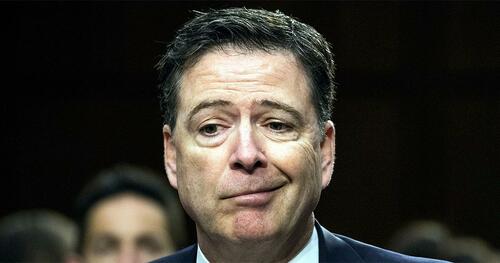Judge Says ‘Government Misconduct’ By DOJ Prosecutor May Have Tainted Comey Case
A federal magistrate judge on Monday said that “government misconduct” may have tainted the DOJ’s case against former FBI Director James Comey, and has ordered prosecutors to turn over records of secret grand jury proceedings to Comey’s defense counsel as they seek to dismiss the false-statement and obstruction-of-Congress charges pending against him in a federal court in Alexandria, Virginia.
“The Court recognizes this is an extraordinary remedy,” wrote judge William Fitzpatrick in a 24-page opinion. “but given the factually based challenges the defense has raised to the government’s conduct and the prospect that government misconduct may have tainted the grand jury proceedings, disclosure of grand jury materials under these unique circumstances is necessary.”
The decision came after Fitzpatrick personally reviewed records of the grand jury proceedings that led up to Comey’s Sept. 25 indictment on charges that he lied to Congress in 2020. The indictment was signed by lead prosecutor Lindsey Halligan – who Trump picked for the job, and who was installed by AG Pam Bondi after other prosecutors resisted pursuing the Comey case.
Fitzpatrick accused the DOJ of flouting attorney-client privilege and potential “fundamental misstatements of law” – and also noted unexplained irregularities in the grand jury transcript.
Specifically, the judge laid out a timeline of the day the two-count indictment of Comey was handed up, noting that Halligan claimed to the court that she last had contact with the grand jury at 4:28 p.m., while the panelists were deliberating.
However, the grand jury rejected one additional count against the former top lawman, necessitating prosecutors to draw up a second indictment for Halligan to sign.
The interim US attorney’s declaration stated that she learned that one count had been rejected at 6:40 p.m. and the hearing on the return of the indictment began seven minutes later. –NY Post
Based on timing evidence, Fitzpatrick finds it nearly impossible that the prosecution team:
-
Learned of the grand jury’s vote,
-
Drafted a new indictment,
-
Presented it to the grand jury, and
-
Received a vote in the 7–12 minute window before it was filed in court.
“The short time span between the moment the prosecutor learned that the grand jury rejected one count in the original indictment and the time the prosecutor appeared in court to return the second indictment could not have been sufficient to draft the second indictment, sign the second indictment, present it to the grand jury, provide legal instructions to the grand jury, and give them an opportunity to deliberate and render a decision on the new indictment,” Fitzpatrick wrote.
“If the prosecutor is mistaken about the time she received notification of the grand jury’s vote on the original indictment, and this procedure did take place, then the transcript and audio recording provided to the Court are incomplete,” he added. “If this procedure did not take place, then the Court is in uncharted legal territory in that the indictment returned in open court was not the same charging document presented to and deliberated upon by the grand jury … and provides another genuine issue the defense may raise to challenge the manner in which the government obtained the indictment.”
Warrants Under Scruitny
Fitzpatrick also criticized prosecutors’ handling of four search warrants executed by the FBI in 2019 and 2020 as part of the bureau’s Arctic Haze probe into how classified information was leaked from Comey’s FBI to news outlets.
The warrants targeted Daniel Richman, a Columbia Law School professor and friend of Comey – and sought information from Richman’s iPhone, iPad, iCloud account and hard drive.
According to Fitzpatrick, while the government allowed Columbia, Richman and his attorney to identify privileged content among those devices and iCloud account, they “never engaged Mr. Comey in this process even though it knew that Mr. Richman represented Mr. Comey as his attorney as of May 9, 2017, and three of the four Richman Warrants authorized the government to search Mr. Richman’s devices through May 30, 2017, 21 days after an attorney-client relationship had been formed.”
Will Comey get off scot-free?
Tyler Durden
Mon, 11/17/2025 – 15:40ZeroHedge NewsRead More






 R1
R1
 T1
T1


